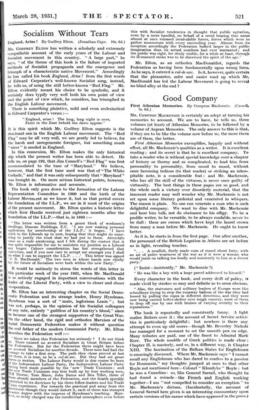Socialism Without Tears
England, Arise ! By Godfrey Elton. (Jonathan Cape. 10s. ed.)
MR. GODFREY ELTON has written a scholarly and extremely sympathetic .account of the early years of the Labour and Socialist movement in this country. "A large part," he says, "of the theme of this book is the failure of imported methods of Socialist propaganda and the emergence and triumph of a characteristic native Movement." Accordingly he has called his book England, Arise ! from the first words of Edward Carpenter's well-known Socialist song, instead, he tells us, of using the still better-known "Red Flag." Mr. Elton evidently meant his choice to be symbolic, and it certainly does typify very well both his own point of view and the point of view which, he considers, has triumphed in the English Labour movement.
There is something plaintive, mild and even ecclesiastical in Edward Carpenter's verses :— " England, arise ! The long, long night is over, Faint in the East behold the dawn appear."
It is this spirit which Mr. Godfrey Elton suggests is the dominant one in the Rnglish Labour movement. The "Red Flag" may be all very well, we are gently led to believe, for the harsh and unregenerate foreigner, but something much " nicer " is needed in England.
In this connexion, Mr. Elton makes the only historical slip which the present writer, has been able to detect. He tells us, on page 192. that Jim Council's "Red Flag" was first accommodated to the tune of "Maryland." We believe, however, that the first tune used was that of "The White Cockade," and that it was only subsequently that "Maryland" was brought in. On more serious historical points, however, Mr. Elton is informative and accurate.
The book only goes down to the formation of the Labour Representation Committee in 1900 and the birth of the Labour Movement as we know it, but as that period covers the foundation of the I.L.P., we see in it most of the origins of the present movement. Mr. Elton quotes a historic letter which Keir Hardie received just eighteen months after the foundation of the I.L.P.—that is, in 1893 :— "The letter was written from a gaunt block of workmen's dwellings, Duncan Buildings, E.C. 'I am now making personal application for membership of the I.L.P.,' it began. I have stuck to the Liberals up to now, hoping that they might do some- thing to justify the trust that we had put in them. Attercliffe came as a rude awakening, and I felt during the contest that it was quite impossible for me to. maintain my_ position as a Liberal any longer. Calmer -consideration has but strengthened that conviction, and if you now care to accept me amongst you I shall 'Jo what I can to support the I.L.P. . . This letter was signed ' J. R. MacDonald. The two men in whose hands now chiefly lay the future of Socialism were both within the new Party."
It would be untimely to stress the words of this letter in this particular week of the year 1981, when Mr. MacDonald is so actively engaged in important conversations with the leader of the Liberal Party, with a view to closer and closer m-operation.
Mr. Elton has an interesting chapter on the Social Demo- cratic Federation and its strange leader, Henry Hyndrnan. Hyndman was a sort of "mute, inglorious Lenin " ; but was not, perhaps, in the opinion of his Socialist colleagues at any rate, entirely" guiltless of his country's blood," since he became one of the 'strongest supporters of the Great War. On the other hand, the rigid and orthodox Marxism of the Social Democratic Federation makes it without question the real father of the modern Communist Party. Mr. Elton describes the Federation well :— " Have we taken this Federation too seriously ? I do not think so. There existed- no avowed Socialism in Great Britain before the Federation. But for the Federation there might have been lo avowed Socialism for another decade. These men had had the ("mirage to take a first step. The path they chose proved at last for them, it is true, to be a cul-de-sac. But they had set great Ones in motion. The Labour Party would in due course be born the Independent Labour Party, the Independent Labour Party ving been made possible by the ' new ' Trade Unionism : and he new Trade Unionism was first built up by four working men, Vill Thorne, Tom Mann, John Burns and Ben Tillet, three of he'll already members of the Federation, and the fourth speedily averted to its doctrines by his three fellow-leaders and his Trade Mon experience. Far towards the practical and away from the • trinaire though they would distort it, each of them was stamped, n seine degree with the impress of Hyndman's teaching. More- -or, so richly charged was the intellectual atmosphere even before this with Socialist tendencies in thought that public agitation, even by a mere handful, on behalf of a creed bearing that name almost at once released incalculable forces, forces which were to gather momentum with every succeeding year. Almost from its inception accordingly the Federation bulked larger in the publics imagination than its actual numbers had, ever warranted ; and. the public was right, for dimly visible, for a while at least, through its ill-manned- ranks was to be discerned the spirit of the age."
Mr. Elton, as an orthodox MacDonaldist, regards the Federation as having been fundamentally upon wrong lines. As he says, it entered a cul-de-sac. Is it, however, quite certain that the pleasanter, safer and easier road up which Mr. MacDonald has led the. Labour Movement is going to reveal no blind alley at the end ?














































 Previous page
Previous page